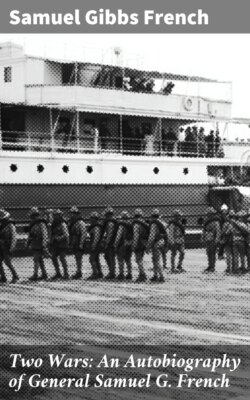Two Wars: An Autobiography of General Samuel G. French

Реклама. ООО «ЛитРес», ИНН: 7719571260.
Оглавление
Samuel Gibbs French. Two Wars: An Autobiography of General Samuel G. French
Two Wars: An Autobiography of General Samuel G. French
Table of Contents
PREFACE
INTRODUCTION
APPENDIX
ILLUSTRATIONS, MAPS, ETC
ERRATA
CHAPTER I
CHAPTER II
CHAPTER III
CHAPTER IV
CHAPTER V
CHAPTER VI
CHAPTER VII
CHAPTER VIII
CHAPTER IX
CHAPTER X
CHAPTER XI
CHAPTER XII
CHAPTER XIII
CHAPTER XIV
CHAPTER XV
CHAPTER XVI
Provisions
Sherman
HOOD
CHAPTER XVII
CHAPTER XVIII
CHAPTER XIX
CHAPTER XX
APPENDIX
Some Statistics of the War
Percentage Killed and Wounded in Late Wars
Slave Owners in the Confederate Army
Prison Deaths and Prisoners
The Authority to Tax
Cost of the War
Naval Power of the United States
Names, Rank, and Positions of Officers on My Staff
Government in Louisiana, 1875–76
Violation of Paroles
Cassville
Slavery Proclamation and Confiscation Act
Indenture
Our Unknown Dead
FOOTNOTES
Отрывок из книги
Samuel Gibbs French
Mexican War; War between the States, a Diary; Reconstruction Period, His Experience; Incidents, Reminiscences, etc
.....
As there may be a desire in long after years to have a knowledge of how the "well-to-do" farmers lived in the early part of the present century in New Jersey, I will describe the condition of the people at my father's. New Jersey was a slave State when I was born. In 1820 slavery was abolished; but there were two hundred and thirty-six slaves for life in 1850 in the State, because it did not emancipate a slave then in being. It only set free the unborn babes. You see the difference between abolition and emancipation? The superabundance of the necessaries of life at that period can scarcely be realized now, and every one fared sumptuously, and nearly all alike. Under the house there were four cellars. As winter approached, perhaps forty cords of oak and hickory wood, four feet in length, were hauled to the wood pile. Some twenty or more fat hogs were killed, the hams and shoulders sugar-cured and smoked in a large stone smokehouse. The sides, etc., were salted down in great cedar tanks. The beeves were killed, the rounds dried, not smoked, and the rest "corned." Minced meat and sausage, in linked chains by the hundreds of pounds, cider boiled down in great copper kettles, and apple butter and pear sauce made without stint. Shad from the fishery were bought for salting down for six dollars per hundred. Oysters by the wagon load were in winter put in the cellar and kept fat by sprinkling them with brine and corn meal. In bins the choice apples were stored, each variety by itself, for daily use, while large quantities were buried in the earthen pits for spring. On the swinging shelves was the product of the dairy, cheese and butter. Four hogsheads were kept full of cider vinegar; and "apple jack" (apple brandy) in barrels in a row, according to age; great old-fashioned demijohns were kept full of cherries, wild and cultivated, covered with brandy. Apples, peaches, pears, huckleberries, currants, plums, etc., were dried on scaffolds in the sun for pies and other purposes: and the children forgot not their ample supply of chestnuts, shellbarks, hazelnuts, etc. Turkeys, geese, and barnyard fowls were raised largely, but they were considered produce for sale. There was no stint to these superabundant supplies, and they were yearly consumed. Rabbits, pheasants, partridges, and woodcock were abundant, and often were secured by trapping; and the ponds and streams were filled with fish. I might perhaps convey to you a better idea of the abundance of fruit and its cheapness by stating that I have seen wagons come to the farm for peaches, and they were told to go into the orchard and get as many as they wanted, and on coming out an estimate would be made of the number of bushels gathered, and they were charged ten cents per bushel. Apples, the finest of varieties, were unsalable, and were hauled to the great public cider mill, ground up for cider, and that distilled into brandy on shares—that is, the mills allowed the farmer a certain number of gallons of brandy for every hundred bushels of apples delivered. And as numerous as were these great cider mills, I have seen the gates locked and teams turned away because of the supply exceeding the capacity of the presses.
There were Germans who wove carpets, and mills that converted the wool into cloth. All along the king's highway, which was marked with granite shafts for milestones, each one denoting, in carved letters, how many miles it was to Camden (Cooper's Ferry), there were smith's shops, wheelwrights, cabinetmakers, and country shoemakers, and taverns for entertainment of "man and beasts."
.....